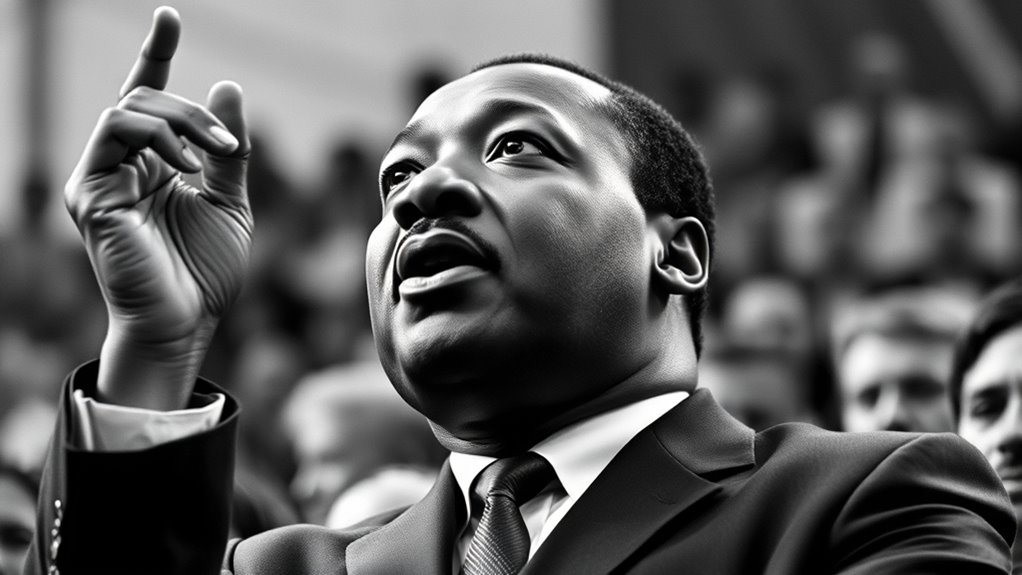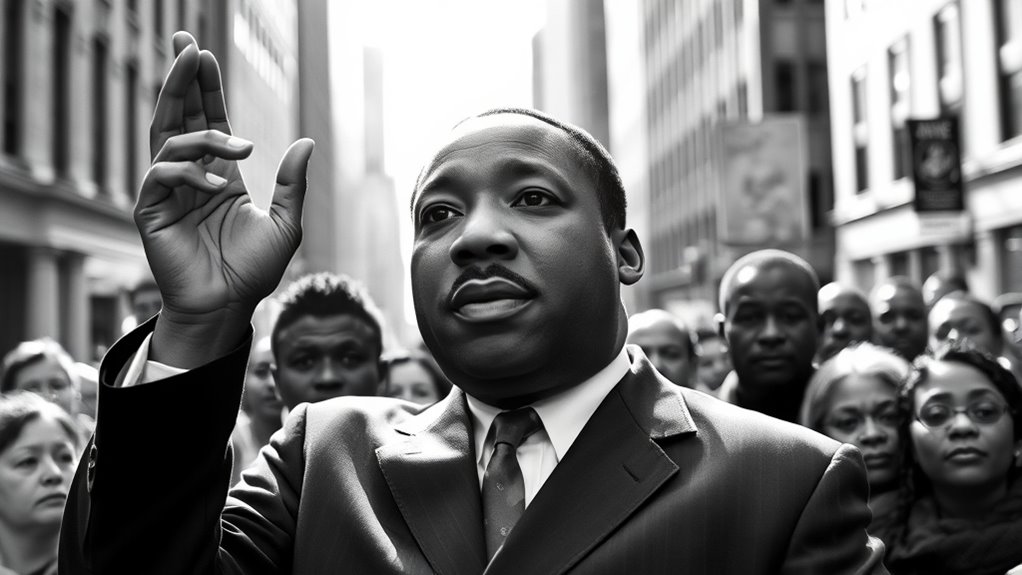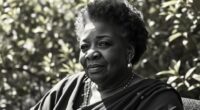Martin Luther King Jr. shows us that the moment to stand up for justice and do what’s right is always now. He believed that moral courage and nonviolent action can challenge injustice at any time, regardless of circumstances. By acting with integrity and perseverance, you can make a real difference in your community. If you want to discover more about his powerful message and how it can inspire you today, keep exploring his impactful legacy.
Key Takeaways
- Martin Luther King Jr. emphasized that moral action should be taken promptly, regardless of circumstances, because delaying justice prolongs injustice.
- His leadership demonstrated that doing what is right is always timely, inspiring immediate action against inequality.
- King believed that moral courage requires acting in the present to challenge injustice and promote societal change.
- The phrase underscores the importance of seizing opportunities for justice whenever they arise.
- King’s advocacy shows that the right moment to act is always now, emphasizing the urgency of moral responsibility.

Have you ever wondered how one person can change a nation? Martin Luther King Jr. did exactly that by standing up for civil rights and proving that nonviolence is a powerful tool for social change. His leadership during the Civil Rights Movement inspired millions and transformed the way people fight injustice. King believed that true progress couldn’t be achieved through violence or hatred but required peaceful protest and unwavering conviction. His approach showed that even in the face of brutality and discrimination, maintaining a commitment to nonviolence could bring about real change.
Martin Luther King Jr. proved that nonviolence and conviction can transform a nation and inspire lasting change.
King’s focus on civil rights was rooted in the idea that every person deserves equality and dignity, regardless of race. He understood that systemic racism and segregation were deeply ingrained in society, but he refused to accept these injustices as inevitable. Instead, he encouraged others to challenge unfair laws and practices through peaceful demonstrations, marches, and speeches. His famous “I Have a Dream” speech painted a vision of racial harmony, emphasizing that peaceful persistence could bridge divides and foster understanding.
Throughout his activism, King faced tremendous opposition, violence, and threats, yet he remained steadfast. His belief in nonviolence wasn’t just a tactic; it was a moral stance rooted in love and respect for all human beings. By advocating for civil rights through peaceful means, he aimed to change hearts and minds, not just laws. This approach helped garner broad support, including from people who might have otherwise remained indifferent or opposed. His leadership proved that nonviolent resistance could be more powerful than force—striking at the core of injustice without perpetuating cycles of violence.
King’s actions and teachings remind us that the time is always right to do what’s right. He showed that moral courage can challenge even the most entrenched systems of oppression. His legacy continues to inspire movements for justice around the world today. By embodying nonviolence and unwavering dedication to civil rights, he demonstrated that change is possible when you stand firm in your values. You can see how his philosophy encourages individuals to speak out against injustice peacefully, knowing that moral persistence can lead to lasting change.
In the end, Martin Luther King Jr. teaches us that true leadership isn’t about force but about conviction. His example urges you to act with integrity, to stand up for what’s right, and to believe that peaceful resistance can move mountains. His life is a testament to the power of nonviolence and the importance of fighting for civil rights, no matter how difficult the journey.
Frequently Asked Questions
What Inspired Martin Luther King Jr. to Become a Civil Rights Leader?
You’re inspired by Martin Luther King Jr.’s faith motivation and childhood influences that shaped his commitment to justice. His deep religious faith and sermons from childhood instilled a sense of moral duty, pushing him to fight for equality. Seeing racial injustice firsthand and being raised in a loving, faith-driven environment motivated him to lead nonviolent protests, believing that doing what’s right is always worth fighting for.
How Did King’s Speeches Influence the Civil Rights Movement?
Imagine a powerful wave of hope crashing over a crowd—King’s inspiring speeches, filled with vivid imagery, ignite that wave. His words of nonviolent resistance resonate deeply, inspiring countless to stand firm against injustice. You can see how his speeches stirred courage, united voices, and fueled the civil rights movement’s momentum. They became a beacon of resilience, encouraging people like you to believe in change through peaceful actions.
What Were the Biggest Challenges King Faced During His Activism?
You face significant challenges during activism, especially dealing with racial discrimination and violent opposition. Racial discrimination hampers progress and fuels frustration, while violent opposition threatens safety and progress. You must stay resilient, using peaceful protests and powerful speeches to counteract hostility. Despite these obstacles, you persist, knowing that your efforts can inspire change and promote equality, even when faced with adversity and hostility.
How Is Martin Luther King Jr. Remembered Today Worldwide?
You see Martin Luther King Jr. remembered worldwide through peaceful protests inspired by his leadership and his enduring legacy celebrations. His message of nonviolent resistance continues to influence social justice movements globally. People honor his memory during Martin Luther King Jr. Day and other events, recognizing his pivotal role in advancing civil rights. His teachings motivate you to pursue justice peacefully, ensuring his legacy remains a powerful symbol for change everywhere.
What Are Some Lesser-Known Facts About Martin Luther King Jr.’S Life?
You might not know that Martin Luther King Jr. was deeply influenced by his family’s legacy and spiritual beliefs. His father was a pastor, shaping his commitment to justice and nonviolence. King also studied theology and was inspired by religious leaders. These spiritual influences fueled his leadership in civil rights. His lesser-known life facts reveal how family and faith profoundly shaped his dedication to equality and social change.
Conclusion
You see, Martin Luther King Jr. believed that doing what’s right isn’t always easy, but it’s always necessary. By questioning the truth of injustice and standing up for what’s just, you can create meaningful change. When you act with courage and conviction, you prove that the time is always right to do what’s right. So, trust that your actions matter—because the fight for justice begins with you, today and every day.









